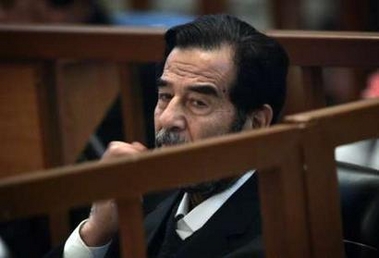BAGHDAD - Saddam Hussein's genocide trial resumed on Monday after chaos
reigned at the last session, when he was repeatedly ejected from the courtroom
and his lawyers walked out over the sacking of the chief judge.

Saddam Hussein pauses as he listens
to a witness testimony during his trial in Baghdad's heavily fortified
Green Zone October 9, 2006. Saddam's genocide trial resumed on Monday
after chaos reigned at the last session, when he was repeatedly ejected
from the courtroom and his lawyers walked out over the sacking of the
chief judge. [Reuters] |
The former Iraqi leader, who was kicked out of court three times during the
previous hearings, took his seat at the start of the trial on Monday, along with
his six co-defendants.
Saddam's defence team are boycotting the trial in protest at the appointment
of new chief judge Mohammed al-Ureybi after chief judge Abdullah al-Amiri was
removed by the government for saying Saddam was "not a dictator".
Legal rights groups have said the dismissal could hurt the trial's
credibility.
The first witness to take the stand on Monday said she did not want her name
or face to be identified. In a separate trial against Saddam, several witnesses
have testified from behind a curtain and with their voices electronically
distorted.
Saddam, 69, his cousin, Ali Hassan al-Majeed, known as "Chemical Ali", and
five former commanders face charges of war crimes and crimes against humanity
for their role in the 1988 Anfal campaign (or Spoils of War) that prosecutors
say left 182,000 ethnic Kurds dead or missing.
Saddam and Majeed also face a charge of genocide. All face the death penalty.
Saddam is waiting for a verdict from a first trial, for crimes against humanity
in the killing of some 148 Shi'ite men from the town of Dujail in the 1980s.
The Anfal trial has featured testimony from villagers recounting their
suffering during Anfal, when Saddam's forces attacked Kurds, razing villages and
killing and displacing thousands of people.
Defendants have argued the attacks were legitimate military strikes against
Iraqi Kurds fighting alongside Shi'ite Iran against Saddam's Sunni-led
government during the Iraq-Iran war.
The court trying Saddam for the Dujail deaths - whose first chief judge quit,
citing political interference - is due to reconvene on October 16 to review
witness testimonies.
A senior source in the court has told Reuters a verdict in that case is
expected to be announced within days of the session opening.